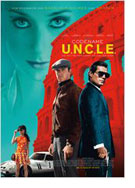

Opening 13 Aug 2015
Directed by:
Guy Ritchie
Writing credits:
Guy Ritchie, Lionel Wigram
Principal actors:
Henry Cavill, Armie Hammer, Alicia Vikander, Hugh Grant
This movie is a breath of fresh air, retro fresh air, that is. Step back in time to the early 60s, those simpler, glorious Cold War days when Soviet Union and American spies were deadly foes in public, but co-conspirators in private, at least when the world had to be saved from imminent destruction.
CIA agent Napoleon Solo (Cavill) and KGB operative Illya Kuryakin (Hammer) join forces in a mission to stop a secret criminal organization from proliferating nuclear weapons which threaten to destroy the entire world. Their only link to this mysterious organization is Gaby (Vikander), an East German auto mechanic who washes up nicely once she escapes to the West. Her estranged father is the brilliant scientific brain behind the sinister nuclear proliferation plot. Not only does Gaby wear those Mary Quant dresses sublimely, it seems she has inherited smart genes from Dad and has plans of her own. Alexander Waverly (Grant) joins the trio midway in Italy as a rather bland pre-Bond British super sleuth.
It’s a blast from the past, imbued with nostalgic ambiance. Cinematographer John Mathieson has created a masterful feels-like-the-60s film. His split screen images hark back to an earlier era in cinematic history, an innocent, uncluttered time long before computer-generated imagery was born. Daniel Pemberton composed the bold, vibrant score and ingeniously recorded it at Abbey Road's Studio Two on vintage equipment creating an authentic 60s sound. The writers weren’t always quite so faithful to 60s dialogue. Words like “low-tech” and “skill set” crept into an otherwise purist film. Only someone of my vintage would notice such a thing.
The humor in The Man from U.N.C.L.E. is witty, timeless, and most likely an homage to the original TV series. Henry Cavill as Solo can be forgiven for his role of Superman in Man of Steel. Armie Hammer as Kuryakin can almost be exonerated for playing the lead to Johnny Depp’s Tonto in The Lone Ranger. The entire cast in the film is charming in in a low-key, 60s sort of way. From the looks of the final scene, Guy Ritchie is planning an U.N.C.L.E. sequel. Fortunately, moviegoers do have an alternative to high-tech, often brutal action thrillers after all. (Pat Frickey)
The 1960s American television series produced by MGM called The Man from U.N.C.L.E., created by Sam Rolfe, is the back drop filmmaker Guy Ritchie along with co-writer Lionel Wigram use to bring-to-life a feature-length film under the same name. The acronym U.N.C.L.E. stands for the United Network Command for Law and Enforcement. The organization is a secret international counter espionage network. Different from that of the CIA and that of the James Bond activities, U.N.C.L.E. attracts agents across the globe to participate in unconventional operations in order to save the world.
Ritchie and Wigram use the same premise from the series centering on a two-man spy team and polar opposites from two different countries: American, Napoleon Solo (Henry Cavill) and Russian, Illya Kuryakin (Armie Hammer). Their unique twist to the storyline is the tale of how U.N.C.L.E. was formed. In the 60s television series the organization already existed. And, though the origin of the series was so long ago, Wigram points out, “Ritchie works his creative magic to make everything feel ’of today’.” ~Saving the world never goes out of style.
Ritchie incorporates the tone of sarcasm and banter in Rolfe’s original characters and adds the right balance of wit, humor and drama. Ritchie says, “The story is largely the evolution of their (the spies) collaboration.” Trust plays a role in their fight against crime and impact it has on each other. He adds, “The fact that you have a capitalist American and a communist Russian forced to work together to neutralize a threat with global stakes...is the spine of the story.”
Synopsis:
It’s the early 1960s, during the Cold War period, an international organization called U.N.C.L.E. (United Network Command for Law and Enforcement) is formed to fight against a dangerous counter organization whose sole aim is to conquer the world, known as T.H.R.U.S.H. (Technological Hierarchy for the Removal of Undesirables and the Subjugation of Humanity). British Alexander Waverly’s (Hugh Grant) task is to recruit special agents across the globe but it has its challenges. Two exceptionally gifted spies are chosen: American CIA agent Napoleon Solo (Henry Cavill) and Russian KGB spy Illya Kuryakin (Armie Hammer). Waverly’s initial task is to bring them in off the field, safely, before they annihilate each other. Neither happy to be on a new task with a so-called enemy, it takes a while before the agents are ready to cooperate. Kuryakin is a volatile but more conventional man. He is the ultimate soldier, giving his best. Solo is the unorthodox: a ladies man, a lover of money. He takes advantage of everyone and everything for his gain. He follows no rules but his own.
The unlikely couple is recruited to stop those connected to T.H.R.U.S.H. who control a branch of world power through the proliferation of nuclear weapons and technology. Their first mission is to find one of Adolf Hitler’s top scientists, Dr. Udo Teller (Christian Berkel) is kidnapped and is assumed forced, by a private group, to develop the nuclear weaponry necessary to gain world power. The only lead to the German scientist is his estranged daughter, Gaby Teller (Alicia Vikander). They find her, they will get their man. Not, exactly! But it’s a good start to infiltrate the criminal organization. The stress Solo and Kuryakin face is the fact that they are up against a ticking time bomb to prevent the global disaster. (Karen Pecota)